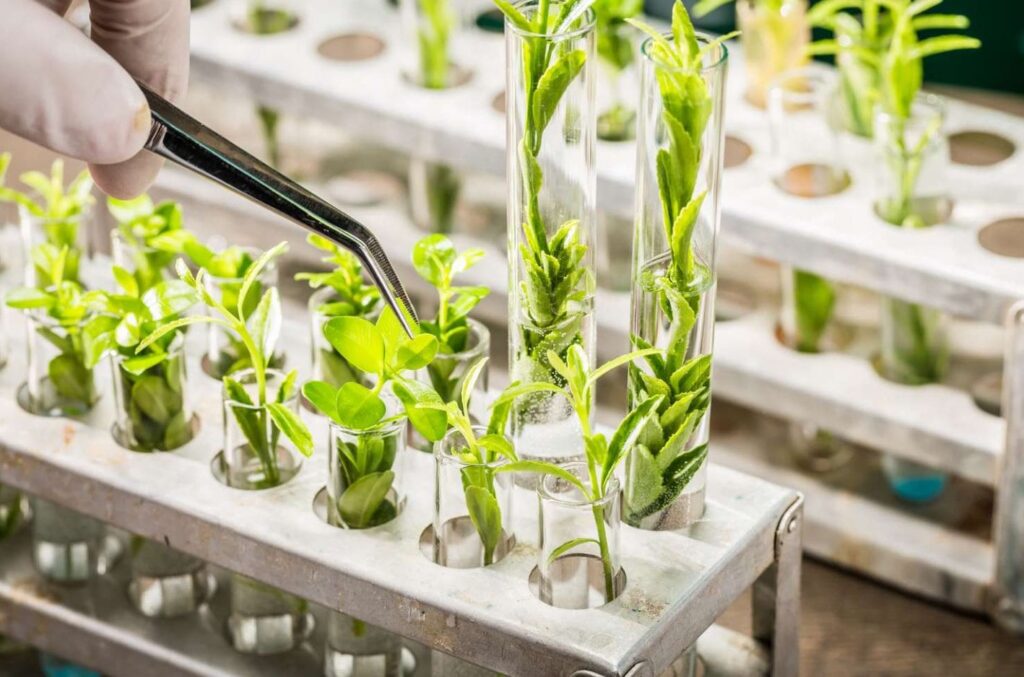Introduction
Adopting biotechnology is an effective way of ensuring global food security and mitigating climate change. It involves using advanced techniques, like genetic engineering, to change the makeup of plants and animals for various purposes, including improving productivity in farming. Biotechnology enhances sustainable agriculture because it reduces emissions and improves the traits of organisms, uses fewer resources than the conventional approach to increase production, and protects the environment, including the soil and water.
Climate Change and Improved Traits of Crops
Agricultural biotechnology helps to mitigate climate change and develop plants with better traits. Planting genetically modified crops lowers greenhouse gas emissions since less fuel is used, requires little tillage, and reduces the need for pesticides and herbicides, whose environmental impact decreased by 18% between 1996 and 2018 (Tyczewska et al. 336). Minimizing emissions through biotechnology helps to fight climate change and supports sustainable agriculture. Biotechnology improves the traits of crops, including the ability to tolerate herbicides, withstand abiotic stress, fight nematodes, resist diseases, and improve yields, quality of produce, and pollination (Tyczewska et al. 335). Such a method enhances sustainable agriculture because farmers can have higher farm outputs. For example, the crops developed can withstand several stresses associated with global warming, such as droughts, floods, and extreme heat (Tyczewska et al. 335). In turn, this approach leads to higher yields and enhances food security even in the face of adverse climatic changes. Thus, the use of biotechnology is an effective way of ensuring food security.

Using Limited Resources to Enhance Production
Biotechnology improves yields even with inadequate resources, ensures efficient absorption and use of crop nutrients, and enhances biofortification. This technique leads to higher production in farms using limited water and land resources and requires less fertilizers or other farm inputs, even under abiotic stress, such as salinity and extreme heat (Das et al. 6). The approach supports sustainable agriculture and helps to ensure food security. Biotechnology also enhances efficiency in the absorption and use of nutrients, like nitrogen, by crops (Das et al. 8). In turn, it improves yields and minimizes environmental pollution of air, land, and water from the chemicals used. Lastly, the use of biotechnology enhances biofortification since it increases the micronutrients and macronutrients in the crops, including vitamin A in rice (Das et al. 10). Such foods can help to address the problem of malnutrition in underdeveloped countries in Asia and Africa. Therefore, biotechnology encourages practices that support sustainable agriculture.
Improving the Quality of Soil
Sustainable agriculture can be enhanced by improving the quality of soil and minimizing the use of chemicals to protect the environment. Biotechnology enhances the process of phytoremediation, which involves planting crops that take up pollutants or chemicals from the ground and gathering and disposing of them safely (USDA par. 4). This practice contributes to sustainable agriculture since it creates more land for farming. Some biotechnology crops, including soybeans, are herbicide-tolerant and need little or no tillage, while others require much less use of pesticides (USDA pars. 7-8). The approach also minimizes the contamination of soils, air, and water through the use of less chemicals. Hence, this technology is beneficial in supporting sustainable agriculture.
Conclusion
Biotechnology facilitates sustainable agriculture by minimizing emissions and improving the traits of organisms, increasing yields with the use of limited resources, and protecting the environment through processes, like phytoremediation. The appropriate farming practices involving living organisms developed using this technology should be adopted to ensure global food security. However, governments should implement effective and reliable regulatory frameworks to prevent the risk of harm associated with its use.
Works Cited
Das, Saurav, et al. “Role of Biotechnology in Creating Sustainable Agriculture.” PLOS Sustainability and Transformation, vol. 2, no. 7, 2023, pp. 1–13, doi:10.1371/journal.pstr.0000069.
Tyczewska, Agata, et al. “Agricultural Biotechnology for Sustainable Food Security.” Trends in Biotechnology, vol. 41, no. 3, 2023, pp. 331–341, doi:10.1016/j.tibtech.2022.12.013.
United States Department of Agriculture (USDA). “Biotechnology FAQs.” 2019, www.usda.gov/topics/biotechnology/biotechnology-frequently-asked-questions-faqs.


